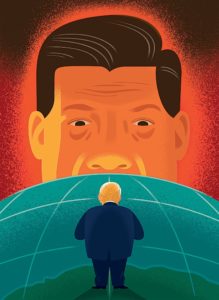Wednesday, November 21st, 2018
Simon Tisdall, - Guardian (U.K.)
Stephan: We are being outplayed by the Chinese all over the world, and it is a trend that is going to become more and more important as the years go by. While our geopolitical policies are mostly about using the military to destroy Islamic societies creating death and misery for millions, the Chinese have spent their money building ports and train stations, and infrastructure of all type all over the world as it pursues a long-term strategy to create a middle class in the nations that interest it, as well as the trade infrastructure to make that possible. Over time which strategy do you think will endure and prevail? Which one is fostering wellbeing? QED.
When I read articles like this one they remind me that putting Donald Trump on the world stage is like tricking out a 12-year-old boy in the gear and uniform of a professional football player and putting him on the field as quarterback.
The unusually rumbustious Asia-Pacific Economic Cooperation (Apec) summit that shuddered to an ill-tempered halt at the weekend proved one thing beyond any doubt: the US and China are intent on doing to the Indo-Pacific region in the 21st century what the US and the Soviet Union did to Europe in the last. Namely, use it as the primary battleground in a global turf war for power and influence.
The jousting superpowers – described by Peter O’Neill, Papua New Guinea’s prime minister and Apec host, as the the “two big giants” in the room – managed to turn what is supposed to be a peaceable platform for advancing multilateral cooperation into a noisy reprise of Captain America versus the Evil Empire. This is not what Bob Hawke and Paul Keating had in mind when Apec was launched in Canberra in 1989.
On this showing at least, the forum’s 21 members, including Hong Kong and Taiwan, must decide whether they want to play Cold War 2. Several have already taken sides, or are in the process of doing so, possibly without sufficient consideration. By partnering with the US in planning a major military base on Manus island in […]
No Comments
Wednesday, November 21st, 2018
JAVIER C. HERNÁNDEZ and QUOCTRUNG BUI , - The New York Times
Stephan: China is outplaying the United States not only at the international level but domestically as well. Here is the data, and the future it portends.

In an unfamiliar moment, China’s pursuit of a larger role in the world coincides with America’s pursuit of a smaller one.
Illustration by Paul Rogers
Imagine you have to make a bet.
There are two 18-year-olds, one in China, the other in the United States, both poor and short on prospects. You have to pick the one with the better chance at upward mobility.
Not long ago, the answer might have seemed simple. The “American Dream,” after all, had long promised a pathway to a better life for anyone who worked hard.
But the answer today is startling: China has risen so quickly that your chances of improving your station in life there vastly exceed those in the United States.
China is still much poorer over all than the United States. But […]
No Comments
Wednesday, November 21st, 2018
Stephan: Further fact-based evidence that Republicans cannot govern.
 Among other results, this year’s midterm elections affirmed this much: in Washington, the two parties now speak for dramatically different segments of the American economy.
Among other results, this year’s midterm elections affirmed this much: in Washington, the two parties now speak for dramatically different segments of the American economy.
Republicans represent the smaller, fading segment, with less-educated, more-homogenous work forces reliant on traditional manufacturing, agriculture and resource extraction. Democrats represent the larger, growing one, fueled by finance, professional services and digital innovation in diverse urban areas.
The 2016 presidential race had signaled as much. Donald Trump carried 2,584 counties across the country, but calculations by scholars at the Brookings Institution showed that the 472 counties Hillary Clinton carried accounted for nearly two-thirds of U.S. economic output.
Now, new Brookings calculations show the same from 2018 House elections. With a few races still undecided, districts won by Democrats account for 61 percent of America’s gross domestic product, districts won by Republicans 38 percent.
That economic separation underpins cultural divisions that usually command more attention. Says Brookings researcher Mark Muro: “The Democratic Party and Republican Party, at this point, really do occupy different economic worlds and represent different economic worlds.”
Analysis by the […]
1 Comment




 Among other results, this year’s midterm elections affirmed this much: in Washington, the two parties now speak for dramatically different segments of the American economy.
Among other results, this year’s midterm elections affirmed this much: in Washington, the two parties now speak for dramatically different segments of the American economy.








